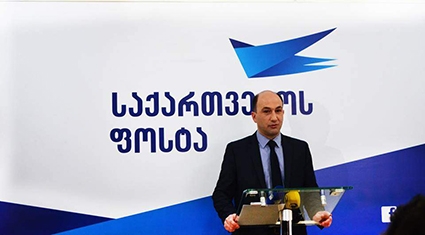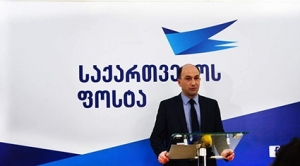Georgian Post: Step by Step to Success
To what extent does the country’s national post meet European standards and what changes are expected in the company? General Manager of the Georgian Post Levan Chikvaidze explains all.
Chikvaidze: For the last 20 years there was practically no Georgian Post. Unfortunately, businesses found their own ways of communication and developed without the postal business. It has become a necessity for companies to identify a staff member to serve as a courier. There is no such precedent in any of the 192 member states of the world postal union. Not to say anything about working conditions at the Georgian Post, the infrastructure was also a complete mess when we arrived– air conditioning in summer and heating in the cold weathers was a luxury for the employees. What’s more, after crossing the Georgian border, partner countries could not track their packages and for this reason a parcel forwarded to Georgia was always considered low priority. Since 2013, management changed and a new strategy was developed, which, along with strategic changes in the company, also meant visual changes. The company’s logo was changed and a swallow became the symbol of the Georgian Post, associated with the happiness and joy of recipients upon receiving their parcels. Investments were made to improve postal services; service centers were renovated; transport was changed and the staff was retrained. Today there are 84 service centers all over Georgia and couriers can deliver parcels to any point in the country.
The Georgian Post, with the full service of products, provides tailored service to customers. Recently, a new service- Avia -was introduced which allows customers to send letters and parcels to 200 countries around the world in two-three days. E-commerce Maleo is also in its test phase. Thanks to Maleo, customers will soon be able to buy any item online and have it delivered to any address. Currently, it is possible to use the service only in Tbilisi and in several other big towns of Georgia. In future, a person from Mestia, for example, will not have to come to Tbilisi to receive a parcel and can instead have it delivered to his/her home in the same amount of time. In 2016, another new service will be established, a novelty from the world postal union, which enables receiving information about the parcel before it reaches the border, allowing an acceleration in customs clearance procedures. At the same time, the information technology department of the Georgian Post have developed a new postal program that the company uses now.
The Georgian Post should use the country’s geopolitical location, manage diversification of the network and become a hub. In Azerbaijan, Armenia and Russia, customers try to receive parcels via Georgia. I find one further project, started in 2013 and named IPS, one of the biggest achievements of the Georgian Post. It is an International Search Program which enables partner countries and customers to track the parcels entering Georgia online. The program also gives the opportunity for transfers between partner countries. After introducing this technology, we can boldly say that we have become full-fledged members of the world postal union. In recent years, the number of corporate contractors of the Georgian Post increased by 50 per cent. We have regained public trust, a fact confirmed by a recent survey. According to the survey, conducted at the end of 2014, customer satisfaction has increased by 24 per cent compared to 2013, due to the implemented changes. The success has become visible to other countries as well. Ukraine Post responded to the changes in the Georgian Post and stated that it is observing the ongoing changes with admiration and would like to share experience in the short time period. At this stage we can consider the Georgian post an organic part of the international postal network. In September 2013, Post Europe experts studied the Georgian Post and offered recommendations.
Q: In order to bring the system in line with European standards, the Georgian Post took on several obligations; however, some remain unfulfilled. When do you plan to fully apply the recommendations?
A: Of course, we will have to fulfill many obligations. At the beginning of October, experts arrived in Georgia to evaluate completion of the 2013 recommendations. At this stage, the main recommendations have been fulfilled. However, there are some shortcomings that we will be able to resolve stage by stage. For example, due to geographical location it is still not possible to implement international standards in certain service centers, but such cases can also be found in other countries. I do not doubt that we will overcome this barrier; we just need more time. In all big towns across the country we can provide world standard services to customers; however, in some service centers the situation is still hard. In the near future we will start the process of their automatization and equipment with transport. It is noteworthy that the World Postal Union has provided a grant, under which the three-year plan of developing this sector in the Georgian Post, and in the country in general, was compiled. The plan, which was also approved by the Georgian government, consists of four big projects: 1. Market research that we have already completed; 2. Development of the state policy; 3. Strengthening of legislative involvement; 4. Commercialization and reorganization of the national operator. We are already ready to complete the fourth part.
Q: You promised restoration of post boxes in residential blocks. How easy is it for customers to communicate by post?
A: We still have plans to restore post boxes in apartment blocks but it requires significant financial resources. We located quite compact collection post boxes in all districts. We also have personal boxes in service centers that can be leased.
On October 15, 2015, at the plenary assembly of Post Europe, 52 European countries will hear the presentation of the Georgian Post on the ongoing processes.
Rusudan Shelia











